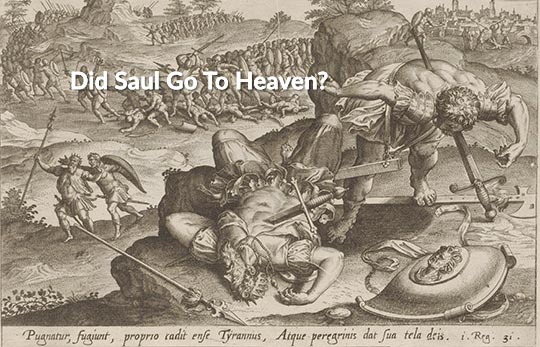Bible Question:
I Samuel 28:19 says that Samuel told Saul that he and his sons would be with him after they died in battle. So did Saul go to paradise and be with Samuel even though the Lord took His hand off of him and he turned wicked, by attempting to take David's life?
Bible Answer:
1 Samuel 28 describes a meeting or a séance that was attended by King Saul and the medium of Endor, who is sometimes called the witch of Endor. During the séance, the prophet Samuel appeared to Saul (1 Samuel 28:10-19). 1 Samuel 25:1 tells us that Samuel had already died. The medium was surprised when she saw Samuel’s form (1 Samuel 28:12). Near the end of the séance, Samuel told Saul that Israel would be defeated by the Philistines and then prophesied that Saul and his sons “will be with me” (1 Samuel 28:19). But what is the meaning of “you and your sons will be with me”? This article answers the question, “Did Saul go to heaven and meet Samuel?” That is, did Saul and his sons go to heaven to be with Samuel, or does it have another meaning?

Here is I Samuel 28:19,
Moreover the LORD will also give over Israel along with you into the hands of the Philistines, therefore tomorrow you and your sons will be with me. Indeed the LORD will give over the army of Israel into the hands of the Philistines!” I Samuel 28:19 (NASB)
There are several possible meanings of the phrase “you and your sons will be with me.”
View 1 — Saul Would Go to Heaven
The first possible meaning is that Saul and his sons would go to heaven. But there is not enough evidence to support this conclusion. The Hebrew text does not say or even hint that Samuel is referring to heaven. So, this meaning seems to be unlikely.
View 2 — Saul Would Go to Hell
A second possible meaning is that Samuel was referring to Saul and his sons meeting him in hell. But this view must be rejected since Samuel was a prophet of God.
View 3 — Saul Would Die and Be Buried
A third possible meaning is that Saul and his sons would die and be buried in a grave. In the Old Testament, Sheol was the common word for the grave. Notice that Genesis 37:35 reports the patriarch Jacob said that he would go down to Sheol. King David expected to go to Sheol too (Psalm 88:3). Yet, it is clear from Scripture that both men went to heaven. So, an Old Testament saint could say his body was going to Sheol (his grave in the earth) when at the same time his spirit went to heaven. The body of unrighteous persons initially also went to Sheol. (Numbers 16:30, 33).
So, Samuel’s statement could just mean that his body was in Sheol since he had died earlier (1 Samuel 25:1), and that Saul and his sons would join him in death. Samuel just meant that Saul would die at a future battle with the Philistines (1 Samuel 31:4-6). It is also important to notice that the Septuagint or the LXX translated the Hebrew Bible into Greek in about the second century B.C.. The LXX translation of I Samuel 28:19 reads “you are going to fall along with your sons.” These translations were closer to the time 1 Samuel was written. Consequently, the LXX’s translation may be more accurate. Therefore, it is possible that Samuel was just saying Saul and his sons would die and be buried.
Conclusion:
Between these three possible meanings, the third view is the most likely. We do not have enough information from the pages of Scripture to jump to the conclusion that Saul and his sons went to heaven. We cannot conclude that Saul went to hell because he sinned by disobeying God or because he visited the medium of Endor. We must be careful to not go beyond what Scripture has stated. An important principle in understanding the meaning of the Bible is that if Scripture is silent, then we must be silent too!
Only God knows if he went to heaven or hell. It is obvious that he and his sons died and their bodies were buried in a grave. That is, they went to Sheol. 1 Samuel 31:8-13 states that the bodies of Saul and his sons were cremated and their bones were buried.
Suggested Links:
Heaven, Paradise, Sheol, Hell, Hades and Lake of FireIs Hell a real place? — What does Jesus say about Hell?
Parable of the Rich Man and Lazarus
Was Paradise inside Hades before Jesus’ death?
Are Ghosts Real? — What does the Bible say?
What is the biblical belief on communing with the dead?